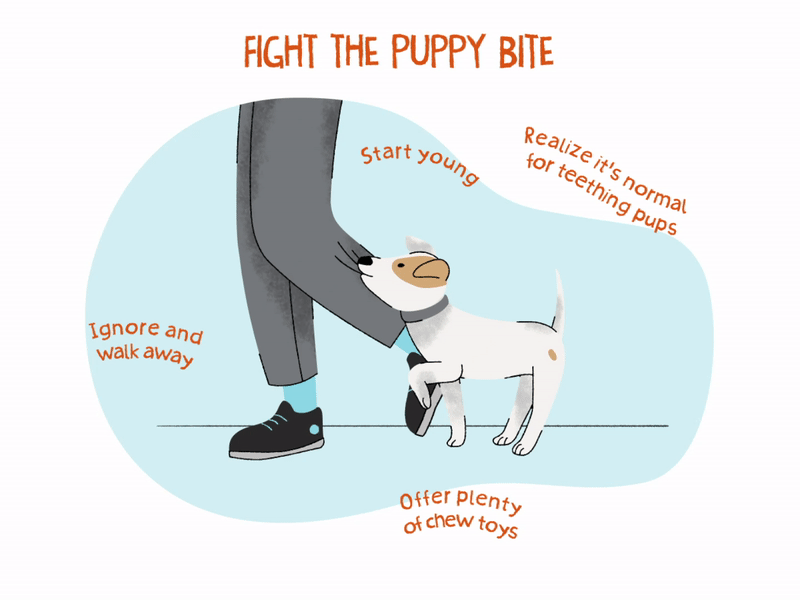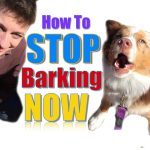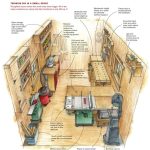To stop a puppy from chewing, provide plenty of chew toys and redirect them when they chew on inappropriate items. Additionally, use bitter-tasting sprays on furniture and keep valuable items out of reach.
Consistent training and positive reinforcement are key to preventing chewing behavior. This will help your puppy learn what is acceptable to chew on. Chewing is a natural behavior for puppies, so it’s important to be patient and consistent in your training efforts.
With the right approach, you can teach your puppy to chew on appropriate items and prevent destructive chewing habits.

Credit: pupford.com
Introduction To Puppy Chewing
Puppies explore the world through their mouths, and chewing is a natural behavior for them. Understanding why puppies chew and recognizing when chewing becomes a problem is crucial for effective training.
Why Puppies Chew
- Puppies chew to relieve teething pain and explore their surroundings.
- Chewing helps strengthen jaw muscles and alleviate boredom.
- Exploring with their mouths is a puppy’s way of learning about the world.
When Chewing Becomes A Problem
- Chewing becomes an issue when puppies destroy valuable items or exhibit excessive chewing.
- If chewing poses a safety hazard or causes damage to furniture, it’s a problem.
- Consistent inappropriate chewing should be addressed through training and redirection techniques.
Identifying The Causes
Identifying the causes of chewing behavior in puppies is crucial to successfully stopping it. Puppies chew for a variety of reasons, including teething, boredom, excess energy, anxiety, and stress. Understanding the underlying cause of your puppy’s chewing habit is the first step towards correcting the behavior.
Teething In Puppies
Puppies go through a teething phase between the ages of 3 and 7 months, during which their baby teeth fall out and adult teeth grow in. This process can be uncomfortable and even painful, causing puppies to chew in an effort to relieve the discomfort. Providing your puppy with appropriate chew toys, such as frozen carrots or rubber toys, can help alleviate their teething discomfort and prevent them from chewing on inappropriate items.
Boredom And Excess Energy
Puppies have a lot of energy and require plenty of physical and mental stimulation to prevent boredom. When left alone for extended periods without proper exercise or stimulation, puppies may turn to chewing to relieve their boredom and expend their energy. Providing your puppy with regular exercise, playtime, and mental stimulation through training or puzzle toys can help prevent destructive chewing due to boredom or excess energy.
Anxiety And Stress
Chewing can also be a sign of anxiety or stress in puppies. Separation anxiety, fear, and other stressful situations can cause puppies to chew as a way to cope with their emotions. Identifying the source of your puppy’s anxiety and addressing it with positive reinforcement training, desensitization techniques, or seeking the help of a professional can help alleviate their stress and prevent destructive chewing behavior.
By identifying the underlying cause of your puppy’s chewing behavior, you can take the necessary steps to prevent destructive chewing and foster positive chewing habits. Whether it’s providing appropriate chew toys, regular exercise and mental stimulation, or addressing underlying anxiety or stress, taking action early can help prevent long-term destructive chewing behavior.
Puppy-proofing Your Home
Secure your belongings and keep electrical cords out of reach to prevent your puppy from chewing. Provide plenty of safe chew toys and redirect their attention when caught in the act. Consistent training and positive reinforcement will help your furry friend learn appropriate chewing habits.
Secure Household Items
To effectively puppy-proof your home, it’s crucial to secure household items that may be tempting for your new furry friend to chew on. Start by identifying any items that are within your puppy’s reach and could potentially be hazardous if chewed. This includes electrical cords, loose cables, and small objects such as coins or buttons. Use cord organizers or cover them with cord protectors to prevent your puppy from getting to them. Keep small objects stored in closed containers or in high places that are inaccessible to your puppy. Remember, prevention is key when it comes to protecting your pup and your belongings.Creating A Safe Space
Another important aspect of puppy-proofing your home is creating a safe space where your puppy can retreat to and feel secure. This can be a designated area in your home, such as a puppy playpen or a gated-off section of a room. Make sure this space is free from any potential hazards or items that your puppy could chew on. Remove any toxic plants, chemicals, or household cleaning products from the area. Provide your puppy with appropriate chew toys to redirect their chewing behavior and keep them occupied. By creating a safe space, you are not only protecting your belongings but also ensuring your puppy’s safety and well-being. In summary, puppy-proofing your home is essential to prevent your new furry companion from chewing on household items and potentially harming themselves. By securing household items and creating a safe space, you can effectively redirect your puppy’s chewing behavior and provide them with a conducive environment for growth and development. Remember, consistency and patience are key when training your puppy, and with time, they will learn what is acceptable to chew on and what is not.
Credit: pupford.com
The Right Chew Toys
To stop a puppy from chewing, providing the right chew toys is crucial. These toys should be durable, safe, and appropriate for their age and breed. By offering an alternative to household items, puppies can satisfy their natural chewing instinct while protecting your belongings.
Choosing Appropriate Toys
Toy Rotation Strategy
When it comes to stopping a puppy from chewing, selecting the right chew toys is crucial. Inappropriate toys can encourage destructive chewing behavior. Ensure you choose toys that are durable and safe for your puppy. Look for toys made of rubber or nylon to withstand chewing. Avoid toys that can be easily torn apart. Puzzle toys and chew treats can also keep your puppy engaged. To prevent boredom, use a toy rotation strategy. Introduce new toys regularly while rotating old ones. This keeps your puppy interested and less likely to chew on furniture. Supervise your puppy’s playtime with toys to ensure safety. Provide a variety of textures and shapes to stimulate your puppy’s senses. Engage your puppy in interactive play to redirect chewing behavior.Training Techniques
Teaching a puppy not to chew can be challenging, but there are some effective training techniques. Provide plenty of chew toys, supervise your puppy, and redirect them to appropriate items when caught chewing. Consistency and positive reinforcement are key to success.
Puppies are adorable, but their chewing habits can be quite frustrating for pet owners. If you are dealing with a puppy that is chewing on everything, don’t worry, there are training techniques you can use to stop this behavior. In this article, we will discuss some effective ways to train your puppy to stop chewing.Positive Reinforcement
One of the most effective ways to train your puppy to stop chewing is through positive reinforcement. Whenever you catch your puppy chewing on something he or she shouldn’t be, redirect their attention to an appropriate toy or chew. When your puppy starts chewing on the appropriate item, be sure to praise them and give them a treat. This will help them associate good behavior with positive rewards.Redirecting Chewing Behavior
Another way to stop your puppy from chewing on inappropriate items is by redirecting their chewing behavior. When you catch your puppy chewing on something he or she shouldn’t be, immediately remove the item and replace it with an appropriate chew toy. Be sure to make the appropriate chew toy more enticing than the item they were previously chewing on. Consistency is key when it comes to training your puppy to stop chewing. Be sure to provide your puppy with appropriate chew toys and discourage them from chewing on inappropriate items. If your puppy continues to chew on inappropriate items, be sure to redirect their attention to an appropriate chew toy and provide positive reinforcement when they use it. Training your puppy to stop chewing can be a challenge, but with the right techniques and consistency, you can teach them good habits. Remember to use positive reinforcement and redirect their chewing behavior to appropriate chew toys. By doing this, you will have a well-behaved and happy puppy in no time.Managing Energy And Boredom
Puppies have a surplus of energy and a natural inclination to explore their surroundings. When they become bored or restless, they often resort to chewing as a way to alleviate their pent-up energy. Managing a puppy’s energy and preventing boredom is crucial in curbing their chewing behavior.
Regular Exercise
Providing regular exercise is essential for channeling a puppy’s energy in a positive direction. Taking your puppy for short walks or engaging in play sessions multiple times a day can help tire them out, reducing their inclination to chew out of boredom.
Mental Stimulation Activities
Mental stimulation activities such as puzzle toys, interactive games, and training exercises can keep a puppy’s mind engaged and prevent boredom. These activities provide a constructive outlet for their energy, reducing the likelihood of destructive chewing behaviors.
Addressing Anxiety-related Chewing
Comforting Your Puppy
Creating a comforting environment is essential in addressing anxiety-related chewing. Establish a safe space for your puppy, such as a cozy bed or a crate, and ensure it is located in a quiet area of your home. Additionally, consider using calming aids like pheromone diffusers or soothing music to help ease your puppy’s anxiety. Providing plenty of physical and mental stimulation through interactive toys and regular exercise can also help reduce stress and anxiety, ultimately minimizing destructive chewing behaviors.
Seeking Professional Help
If your puppy’s chewing behavior persists despite your efforts, seeking professional help is crucial. Consult with a veterinarian or a certified animal behaviorist to address any underlying medical issues or deep-seated anxiety. These professionals can offer tailored advice and behavior modification techniques to help your puppy overcome anxiety-related chewing. Additionally, they can recommend medications or supplements that may help manage your puppy’s anxiety and reduce destructive chewing tendencies.

Credit: m.youtube.com
Consistency Is Key
When it comes to stopping a puppy from chewing, consistency is key. It’s important to establish a routine and involve all family members to effectively address this behavior.
Establishing A Routine
Establishing a consistent routine for your puppy is crucial in preventing chewing behaviors. Ensure they have regular feeding times, exercise, and playtime to keep them mentally and physically stimulated.
Involving All Family Members
Getting the entire family involved in the training process is essential. Consistency in enforcing the rules and providing appropriate chew toys will help the puppy understand what is and isn’t acceptable behavior.
When To Consult A Vet
To address how to stop a puppy from chewing, consult a vet if chewing persists despite training efforts. Vets offer tailored advice on behavior modification and potential health issues causing excessive chewing habits. Seeking professional guidance ensures a holistic approach to curbing destructive behavior.
When to Consult a Vet If your puppy’s chewing behavior seems excessive, or if you notice any unusual symptoms alongside the chewing, it’s important to consult a vet. Vets can help determine if there are any underlying health issues contributing to the behavior.Signs Of Nutritional Deficiencies
If your puppy’s chewing seems relentless and is accompanied by signs of nutritional deficiencies such as dull coat, lethargy, or poor appetite, it’s crucial to seek veterinary advice. Nutritional imbalances may be contributing to the excessive chewing behavior.Chewing Accompanied By Other Symptoms
If your puppy’s chewing is accompanied by symptoms such as vomiting, diarrhea, or abdominal discomfort, it’s essential to consult a vet promptly. These additional symptoms could indicate an underlying health issue that requires professional attention. In some cases, chewing behavior may be indicative of more serious health concerns, making it crucial to seek veterinary guidance to ensure your puppy’s well-being.Long-term Strategies
Prevent your puppy from chewing with effective long-term strategies. Train them with positive reinforcement, redirect their attention to appropriate toys, and provide mental and physical stimulation to discourage destructive chewing habits. Stay consistent and patient to achieve lasting results.
Puppies are adorable, but they can also be quite mischievous. One of the most common problems that puppy owners face is chewing. Puppies love to chew on everything from shoes to furniture, and it can be frustrating and expensive to deal with. While there are some quick fixes for stopping a puppy from chewing, it’s important to have some long-term strategies in place to prevent this behavior from becoming a habit.Continued Training
Training is key to stopping a puppy from chewing. It’s important to start training your puppy as soon as you bring them home. Basic obedience training will teach your puppy what is expected of them, and it can also help with chewing. If your puppy knows basic commands like “sit” and “stay,” you can use these commands to redirect them when they start to chew on something they shouldn’t. In addition to basic obedience training, it’s a good idea to train your puppy specifically on chewing. You can do this by providing them with chew toys and teaching them which toys are appropriate to chew on. You can also use taste deterrents, like bitter apple spray, to discourage your puppy from chewing on certain objects.Regular Check-ups And Care
Regular check-ups with your veterinarian are important for your puppy’s overall health, but they can also help with chewing. Your vet can check your puppy’s teeth and gums to make sure they’re healthy, and they can also give you tips on how to prevent chewing. It’s also important to provide your puppy with plenty of exercise and mental stimulation. Puppies who are bored or under-stimulated are more likely to chew on things they shouldn’t. Make sure your puppy has plenty of toys to play with and take them for walks and playtime outside. Stopping a puppy from chewing can be a challenge, but with these long-term strategies in place, you can prevent this behavior from becoming a habit. Continued training, regular check-ups with your vet, and providing your puppy with plenty of exercise and mental stimulation are all key to stopping chewing. With patience and persistence, you can help your puppy become a well-behaved and happy member of your family.Frequently Asked Questions
At What Age Do Puppies Stop Chewing?
Puppies typically stop chewing around six to nine months old as they finish teething.
How Do I Teach My Puppy To Stop Chewing?
To teach your puppy to stop chewing, provide plenty of chew toys, praise good behavior, and redirect when they chew on inappropriate items. Consistency and positive reinforcement are key to breaking this habit.
How Do You Discipline A Puppy That Chews Everything?
Redirect the puppy to appropriate toys, discourage bad behavior, and provide mental and physical stimulation.
How To Stop A Dog From Chewing Everything When Left Alone?
To stop a dog from chewing when alone, provide plenty of chew toys and treats. Use deterrent sprays and keep valuable items out of reach. Gradually increase alone time to build trust.
Conclusion
To sum up, addressing your puppy’s chewing behavior requires patience, consistency, and positive reinforcement. By providing appropriate chew toys, supervising closely, and redirecting their focus, you can help them develop good habits. Remember, understanding your puppy’s needs and behavior is key to successful training and a happy, well-behaved companion.



